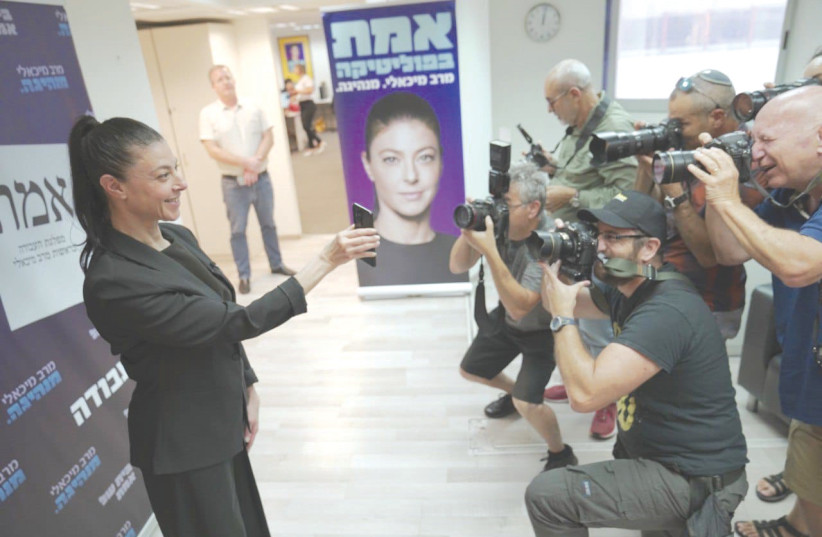The Labor primary election will be held on Tuesday, moved forward after the ceasefire that ended Operation Breaking Dawn on Sunday night.
The primary includes 34 candidates, with the first spot reserved for Transportation Minister Merav Michaeli, who won the party leadership election on July 18.
Labor is currently polling at an average of 5.23 seats, according to Hamadad, a website that tracks and computes poll averages ahead of elections.
The party rules stipulate that beginning with the No. 2 spot, the list must include an even number of men and women in a “zipper” alignment of alternating spots.
There are 39,548 people registered to vote, with 5,000 of these registered as new party members since the election was announced on June 20.

A poll published on Sunday on the Labor party website did not include enough participants to be statistically significant, but still may provide a general picture of who are the front-runners. The three contestants who led the pack were MKs Naama Lazimi, Efrat Reiten and Gilad Kariv. MK Emilie Moatti came in a close fourth, and candidate Yaya Fink, MK Ram Shefa, and Public Security Minister Omer Bar Lev finished in fifth, sixth and seventh place, respectively.
If Lazimi and Reiten indeed come out on top, they will be placed in spots two and four, and Kariv would take the No. 3 spot. No. 5, which would be reserved for a man and could be the final spot, will presumably be occupied by either Fink, Shefa or Bar Lev.
The three candidates
Out of the three, Bar Lev had the most public exposure this past year in an important ministerial role. However, he made a number of gaffes in speeches and interviews. In addition, a campaign led by Bar Lev’s ministry to mitigate crime in the Arab sector looked successful until an uptick in homicides in June brought that number back to the annual average.
Bar Lev won the previous primary election in February, so a fifth-place finish would indicate that his popularity has indeed diminished.
Shefa is a “classic” Labor candidate in that he was active during the past Knesset tenure trying to advance economic left-wing policies. Most noticeable was his fierce opposition to the agricultural reform led by Finance Minister Avigdor Liberman and Agriculture Minister Oded Forer, both of Yisrael Beytenu.
Shefa argued that the reforms would hurt the local agricultural sector. While the reform, which passed on June 30, the day of the Knesset’s dissolution, ended up including direct governmental financial support to local farmers and other initiatives to ensure that they do not collapse, Shefa’s opposition at times seemed to be populist and exaggerated. It is not clear if Labor voters will reward or punish him for his efforts.
Fink is at a disadvantage since he did not serve as an MK, and is somewhat of a dark-horse candidate. However, his activities as head of “Darkenu,” an organization that promotes a left-wing agenda, earned him public recognition. He also has political experience as chief of staff for former opposition leader Shelly Yachimovich, and has already participated in a Labor primary, finishing a respectable 12th ahead of the March 2019 election. He is also only 38 years old, and could overshadow Shefa as a new ‘young’ representative.
According to Labor’s rules, one spot in every five is reserved for the party leader to choose. In other words, between spots two and six, the leader – in this case Michaeli – can choose whomever she wants, and thus whoever finishes fifth in the primary will be slotted into the No. 7 spot. This spot must be reserved for a woman, and based on the poll, would be occupied by Moatti, and No. 8 would go to whomever finishes second in the Shefa-Bar Lev-Fink trio.
Assuming that Labor does indeed win five seats, the next question is whether the party joins the next government. If it does, at least two of its members could become ministers and quit the Knesset as part of the Norwegian Law. This would bring No. 6 and No. 7 into the Knesset. If a third Labor member becomes a minister and resigns, No. 8 will enter as well.
This means that realistically, anyone who does not finish in the top seven in the primary will most likely not make it into the Knesset. These may include current Diaspora Affairs Minister Nachman Shai and MK Ibtisam Mara’ana-Menuhin.
The Likud primary election is on Wednesday.
